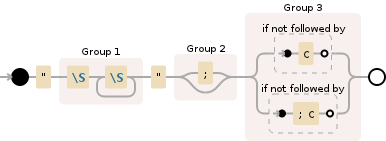The problem is that you don’t want to make the semicolon optional in the sense of regular expression. An optional semicolon implies that the matcher is allowed to try both, matching with or without it. So even if the semicolon is there the matcher can ignore it creating an empty match for the group letting the lookahead succeed.
But you want to consume the semicolon if it’s there, so it is not allowed to be used to satisfy the negative look-ahead. With Java’s regex engine that’s pretty easy: use ;?+
This is called a “possessive quantifier”. Like with the ? the semicolon doesn’t need to be there but if it’s there it must match and cannot be ignored. So the regex engine has no alternatives any more.
So the entire pattern looks like \"(\S\S+)\";?+(?!c) or \"(\S\S+)\"(;?+)(?!c) if you need the semicolon in a group.
